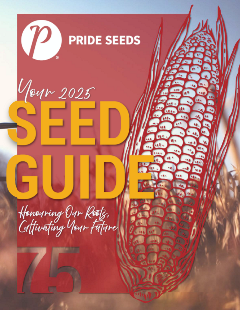WELCOME JEREMY O'SHEA TO PRIDE SEEDS

Enhance your knowledge and stay ahead with PRIDE SEEDS Corn and Soybean School videos.
Browse our selection of products below
___________________________________________________________________________________________________________________________________________

2024-2025 PRIDE Seeds Product GuideYou can find all of our products on the website, including supporting performance data and create your own personalized guide called My Guide. You can also download the digital version of our printed product guide which includes product comparison charts. |
SHOP THE PRIDE SEEDS E-STORE
-7.png?sfvrsn=87920db3_3)
STAY UP-TO-DATE WITH PRIDE SEEDS LATEST BLOGS, NEWS AND ARTICLES
Corn Seeding: Proper Depth is Crucial
And just like that, planting season is right around corner. When it comes to planting corn, it is important to get the depth right, as it is essential for proper root development, growth, and maturity.
In Western Canada, corn needs to be planted deeper than other crops grown (canola, flax wheat, barley, oats, etc.). Ideal planting depth for a colder climate is 1.5 – 2.0 inches into 0.5” of soil moisture. Where in some areas of Eastern Canada, lighter soils and later planting can warrant deeper depths of 2.5” -3" this allows us to capture more consistent soil moistures and temperatures for improved consistency of emergence.
Background: Corn Root Structure
Before discussing the implications of planting too shallow or deep, it is important to understand the development and structure of corn roots systems. Once corn seed is planted, the seed imbibes water and the water-dissolved nutrients in the embryo. These nutrients participate in a series of biochemical reactions that result in germination. The first structure to emerge from the seed is the radical root. After emergence of the radical, the coleoptile (not a root structure) emerges, followed by the lateral seminal roots. The radical and lateral seminal roots make up the seminal root system.
The seminal root system uptakes water for the growing seedling, but this root system does little nutrient uptake. Once the seedling has emerged above ground, the seminal root system growth slows, and the nodal root system develops.
The nodal root system develops at nodes right above the mesocotyl of the stem (~ 0.5 – 0.75” below the soil surface). The first set of nodal roots develop at the lowermost node and continue to develop at their respective nodes progressing toward the soil surface. Nodal root set development is aligned with leaf collar development - if the seedling has two sets of nodal roots it is at/near the V2 leaf stage. As the nodal root system develops, the seminal root system plays a less crucial role in water uptake. Nodal roots are essential for structural support and the majority of nutrient and water uptake.
The Effects of Planting Too Deep or Too Shallow | |
Too Shallow | Too Deep |
Poor development of nodal root system | Exposure to cold soil temperatures |
Early season lodging | Delayed/ no emergence |
Poor plant health mid-late season | Leafing out underground |
Setting your planter at your ideal planting depth for corn optimizes good seed-to-soil contact which is vital for water uptake by the seed and the germination process. The seed needs to be placed into soil moisture for water uptake to occur. The
soil moisture at planting depth should be even throughout the seedbed to promote uniform imbibition and germination leading to even emergence. In addition to this, the ideal depth allows for the development of a strong nodal root system, essential
for rapid plant growth and development.
 Consequences of Planting Too Shallow or Too Deep
Consequences of Planting Too Shallow or Too Deep
It is important to remember that planting too shallow is worse than planting too deep. During the season, it is more common to identify problems in corn fields planted too shallow.
Planting too shallow can result in poor development of the nodal root system, resulting in reduced water, nutrient uptake and plant lodging. Reduced access to nutrients and water can stress plants, resulting in poor plant health and lower yields. Plants tend to lodge when the nodal root system is poorly developed due to the lack of support provided to this tall, leafy plant. Plants with small, shallow root systems can be referred to as having, “rootless corn syndrome.”
Connect with your local PRIDE Seeds Agronomist for more information or any questions you have on this agronomic topic.
TAKE PRIDE IN YOUR INBOX
Expert advice, news and information
THE PRIDE SEEDS ADVANTAGE
Farming is one of the most demanding industries in the world, subject to a variety of factors such as time, weather, and global pressures. You know this every time you look out the window and think about the field in front of you. Growers and dealers deserve an advantage: The PRIDE Seed Advantage.
LEARN MORETHE PRIDE SEEDS ADVANTAGE
Every year PRIDE Seeds works hard to produce leading-edge products that enable success where it matters most, on your farm. Our dedicated team strives to provide sales expertise, agronomy support, quality production, and service tailored to meet your needs.
LEARN MORE

Leave a commentOrder by
Newest on top Oldest on top